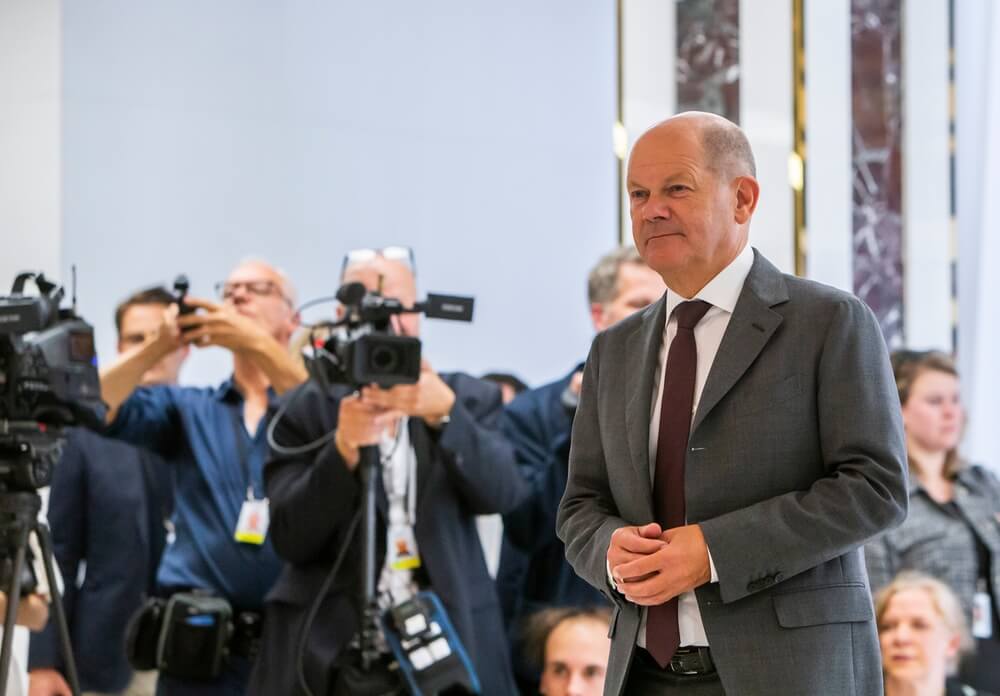Germany is on course to toughen its stance on China, as it appears increasingly certain that it will become directly involved in the long-running tensions in the Taiwan Strait.
The frigate Baden-Württemberg, accompanied by the support ship Frankfurt am Main, with a total of about 400 sailors, has been participating in allied operations in the Pacific for some time. However, all eyes are on whether the most modern German Navy ship and its support ship will pass through the Taiwan Strait, which China considers its waters.
German commanders have not commented on their routes, including whether and when they would pass through the 160-kilometre-wide corridor between Taiwan and China’s mainland.
All of their remarks, however, suggest that passing through the disputed zone is a certainty. German warships will pass through the Taiwan Strait on their route from South Korea to the Philippines in the middle of this month, according to Spiegel on Saturday.
German Rear Admiral Axel Schulz, who commands the convoy, told Reuters earlier that the passage through the Taiwan Strait was just as normal as the passage through the English Channel.
"I expect the Chinese navy and potentially the coastguard or maritime militia to escort us," said Schulz.
However, Beijing is unlikely to view this German military operation as routine, leading to an expected diplomatic protest reaction. "China has always opposed undermining China's territorial sovereignty and security under the guise of 'freedom of navigation'," stated the foreign ministry in Beijing regarding the German military operation.
Change of relations
It has been 22 years since German warships last passed through the Taiwan Strait, and since then, the relations between China and the West, including Germany as part of it, have undergone major changes.
From the former strong economic partnership, accompanied by the rise of the Chinese economy after joining the World Trade Organisation in 2001, relations with the West increasingly took on the characteristics of fierce competition.
With Xi Jinping leading China, the rivalry has shifted to the security sector, characterised by mutual tensions, with Taiwan and North Korea at its centre.
Germany demonstrates its desire to be a more active part of the allied presence in the Indo-Pacific region
Germany demonstrates its desire to be a more active part of the allied presence in the Indo-Pacific region, which it has defined as an area of critical importance for global security and economy.
“We want to contribute to compliance with international law and expand our relationships with our partners there in the region. Looking the other way, not showing a presence in the Pacific and not standing up for the rules-based order is and will not be an option for Germany,” said German Defence Minister Boris Pistorius last May, when he saw off two military ships to the Indo-Pacific mission, which will last until the end of the year.
Loyalty to allies
Germany's naval action in China's backyard will demonstrate Berlin's support for its allies' efforts to curb China's military ambitions in the region.
In recent months, German ships have participated in five weeks of allied naval exercises in the Pacific, then stayed in Japan, where the two armies worked on improving mutual cooperation. After South Korea and the Philippines, they will stop in Singapore and India on their way back to the German bases.
 Olaf Scholz's government adopted the Strategy on China that focuses on the protection of national economic interests while also giving direction to the EU's policy towards Beijing
Olaf Scholz's government adopted the Strategy on China that focuses on the protection of national economic interests while also giving direction to the EU's policy towards Beijing
The military operation testifies to Germany's intention to more convincingly show its commitment to the West's joint stance towards China as a growing economic and security challenge, given that some of Berlin's previous steps were viewed as economically motivated soloing.
In the middle of 2023, Olaf Scholz's government adopted the Strategy on China as a comprehensive document that focuses on the protection of national economic interests while also giving direction to the EU's policy towards Beijing.
Berlin’s step forward
The tightening of EU policies towards increased imports from China, particularly imports of electric vehicles, is part of Germany's somewhat harsher positioning towards Beijing than the previous governments in Berlin had.
However, even within the ruling coalition, there is frequent criticism of the main course regarding China for being insufficiently energetic.
Germany's military presence in the Pacific now appears to be Berlin’s significant step forward towards the shared allied strategy
The Greens and their foreign minister, Annalena Baerbock, are calling for less balancing and more decisiveness in tying together human rights issues in China and an over-reliance on imports of critical materials into Berlin's overall foreign and security policy.
Germany's military presence in the Pacific, along with contacts and exercises with regional partners, now appears to be Berlin’s significant step forward towards the shared allied strategy of ensuring free navigation through the corridors that carry half of global container transport and nearly 90% of the world's largest ships by capacity.